2002 年 6 月北京成人英语三级考试真题
Part I Reading Comprehension (40%)
Directions: There are four passages in this part. Each passage is followed by
some questions or unfinished statements. For each of them there are four choices
marked A, B, C and D. You should decide on the best choice and mark the
corresponding letter on the Answer Sheet with a single line through the center.
Passage 1
Questions I to 5 are based on the following passage:
On November 19, 1863, Abraham Lincoln went to Gettysburg in Pennsylvania to speak
at the National Soldiers Cemetery. The Civil War was still going on. There was
much criticism of President, Lincoln at the time. He was not at all popular. He
had been invited to speak at Gettysburg only Out of politeness. The principal
speaker was to be Edward Everett, a famous statesman and speaker of the day.
Everett was a handsome man and very popular everywhere.
It is said that Lincoln prepared his speech on the train while going to Gettysburg.
Late that night, alone in his hotel room and tired out, he again worked briefly
on the speech. The next day Everett spoke first. He spoke for an hour and 57 minutes.
His speech was a perfect example of the rich oratory of the day. Then Lincoln rose.
The crowd of 15,000 people at first paid little attention to him. He spoke for
only nine minutes. At the end there was little applause. Lincoln turned to a friend
and remarked, “I have failed again.” On the train back to Washington, he said
sadly,“ That speech was a flat failure, and the people are disappointed.
Some newspapers at first criticized the speech. But little by little people read
the speech they began to understand better. They began appreciate its simplicity
and its deep meaning. It was a speech which only Abraham Lincoln could have made.
Today, every American school child learns Lincoln's Gettysburg Address by heart.
Now everyone thinks of it as one of the greatest speeches ever given in American
history.
1. In 1863,Abraham Lincoln was ________
A. very critical
B. unpopular
C. very
popular
D. very courteous
2. Lincoln was invited to speak at the National Soldiers Cemetery because he was
______
�
A. a famous speaker
a very handsome man
C. President of the country
statesman
B.
D. a popular
3. It can be inferred from the text that _________.
A. Lincoln prepared his speech very carefully before he went to Gettysburg
B. Lincoln was very busy at the time and didn't have much time to prepare his speech
C. Lincoln's speech was full of rich words
D. Lincoln's speech was very long
4. It was a fact that Lincoln's speech was _________.
A. an immediate success
B. warmly applauded
C. a total failure
D. not well-received at first
5. Which of the following statements is NOT true according to the passage?
A. Lincoln's Gettysburg Address has deep meaning.
B. Lincoln's Gettysburg Address is simple in style.
C. Lincoln's Gettysburg Address is memorized by every American school child.
D. Lincoln's Gettysburg Address is the greatest speech ever delivered in the United
States.
Passage 2
Questions 6 to 10 are based on the following passage:
Animals seem to have the sense to eat when they are hungry and they do not eat
more than their bodies need. It has been demonstrated that rats will, when given
a choice over a period of time, prefer water with vitamins to water without
vitamins even though there is no difference in taste or smell between the two water
bottles. When a fragrant flavor was added to the vitamin-enriched fluid, the rats
did seem to develop a taste for it and kept drinking it, even after the vitamins
were switched to the clear water. In time, however, they broke the habit and
went back to where the necessary vitamins were. In a classic experiment, babies
of 6 to 12 months old were placed in a cafeteria feeding arrangement, with a wide
selection of baby food before them. They were given whatever food they pointed
�
to or appeared interested in. We are told that at first they showed some unusual
eating patterns, but that over a period of time they managed to select
well-balanced diet. So, in selecting food, rats and babies do seem to know and
act on what's best for them. Apparently, there is a kind of“body wisdom,” which
humans soon lose. Most of us do not eat as wisely as we could. Many of our food
preferences are culturally determined and influenced by long-established habits.
Some people eat fox, dog and blackbirds, while we eat cows and pigs. So what
people eat and how much they eat seems to be greatly influenced by what is going
on around them.
6. In the experiment on rats, a fragrant flavor was added to the rat's drinking
water to ________
A. encourage rats to drink vitamin-enriched water
B. find out rats preference in flavor
C. test whether rats know which drink is good for them
D. demonstrate that vitamins are tasteless
7. The expression “the habit” (para. 1, sentence 4) refers to drinking water
which _______
A. has no smell B. is tasteless
C. has vitamins D. is flavored
8. According to the passage, adults eating habits differ from those of babies
because _________
A. adults know better than babies what kind of food are good for their health
B. adults usually cannot resist the temptation of various delicious foods
C. adults' eating habits are closely related to the social and cultural customs
D. adults have more choices of food than babies in eating patterns
9. The author implied in the passage that most of us _________
A. eat a balanced diet
B. choose the food that is of nutrition
C. have the habits influenced by the surroundings
D. like to eat the food with a fragrant flavor
10. As far as their eating habits are concerned, babies and rats are similar in
that _________
�
A. both have the wisdom to choose a balanced diet
B. both prefer flavored food and drink
C. both have the same eating patterns
D. both develop a taste for the same kinds of flavors
Passage 3
Questions 11 to 15 are based on the following passage:
In ancient times the most important examinations were spoken, not written. In
the schools of ancient Greece and Rome, testing usually consisted of saying poetry
aloud or giving speeches. In the European universities of the Middle Ages,
students who were working for advanced degrees had to discuss questions in their
field of study with people who had made a special study of the subject. This custom
exists today as part of the process of testing candidates for the doctor's degree.
Generally, however, modern examinations are written. The written examination,
where all students are tested on the same question, was probably not known until
the nineteenth century. Perhaps it came into existence with the great increase
in population and the development of modern industry. A room full of candidates
for a state examination, timed exactly by electric clocks and carefully watched
over by managers, resembles a group of workers at an automobile factory.
Generally, during examinations teachers and students are expected to act like
machines.
One type of test is sometimes called an “objective” test. It is intended to deal
with facts, not personal opinions. To make up an objective test the teacher writes
a series of questions, each of which has only one correct answer. Along with each
question the teacher writes the correct answer and also three statements that look
like correct answers to students who have not learned the material properly.
11. In the Middle Ages students _________
A. took objective tests
specialized in one subject
B.
C. were timed by electric clocks
D. never wrote exams
12. The main idea of paragraph 3 is that _________
A. workers now take examinations
B. the population has grown
C. there are only written exams
�
D. examinations are now written and timed
13.The kind of exams where students must select answers are _________
C.
B. around
D.
A. personal
objective
B. spoken
D. written
14. Modern industry must have developed ________
A. before the Middle Ages
the 19th century
C. in Greece or Rome
machines to take tests
15. It may be concluded that testing _________
A. should test only opinions
B. Should always be written
C. has changed since the Middle Ages
D. is given only in factories
Passage 4
Questions 16 to 20 are based on the following passage:
The market investigation is indispensable to sales promotion. They are as closely
related as the lips and teeth, so to speak. What you produce is for sale on the
market. It would he impossible to succeed in selling a product without first
investigating the market.
In the international market, goods on sale coming from countries and suppliers
are always facing keen competition. Under such circumstances, they will try
everything possible to familiarize themselves with the market conditions. In
making investigations, we ought to get information about what similar items the
competitors are offering on the market, what prices they are quoting (报价),
what features their products have, who are their regular customers, etc. Then,
how can we obtain such information? There are many channels that we can make use
of in doing this sort of work. The commercial counselor's offices of our embassies
stationed abroad can help us in making market investigations. Nowadays, our import
and export corporations send their trade groups abroad every now and then. One
of their purposes is to make market surveys on the spot.
Certainly, face-to-face talks with foreign businessmen are also important
channels to get market information. The Chinese Export Commodities Fairs and some
�
other fairs of similar nature as well as visits of foreign businessmen provide'
us with such opportunities. Of course, there are some other ways of making market
investigations.
16. In making market investigation, one should _______.
A. get enough information concerned
B. advertise his products
C. produce high quality goods
D. none of the above
17. The word “indispensable” in the first line means _________.
A. impossible
advisable
B. essential
C.
D. available
18. Which of the following statements is not true?
A. The relationship between market investigation and sales promotion is just as
that of the lips and teeth.
B. It is impossible to succeed in selling a product without market Investigation.
C. There are various ways of making market investigation.
D. Production goes before market investigation.
19. Making market investigation is very important because ________.
A. in market, goods on sale are numerous
B. every producer is facing keen competition
C. it can greatly promote sales
D. all of the above
20. All the following are channels to get market information except________.
A. to have commercial counsellor's office of our embassies stationed abroad
B. to promote the quality of our own products
C. to send trade groups abroad every now and then
D. to have face-to-face talks with foreign businessmen
Part II Vocabulary and Structure (40%)
�
Directions: In this part there are 40 incomplete sentences. For each sentence
there are four choices marked A, B, C and D. Choose the ONE answer that best
completes the sentence. Then mark the corresponding letter on the Answer Sheet
with a single line through the center.
21. Having finished the letter, he _________ it carefully and sealed the envelop
with a kiss.
A. folded
turned
B. bent
D. curved
C.
22. Last year ________ of new books were published on environmental protection.
A. the hundred
hundred
B. hundreds
C. a
D. one hundred
23. Literature and art have a great influence _________ people's ideology.
A. to
on
onto
B.
C. for
D.
24. Just as a married man cannot leave his work, a poor man cannot ________ to
get sick.
A. have
go
B.
C. expect
D. afford
25. _____, we keep records on all the experiments so that we may have
enough
data.
A. As a
whole
rule
C. On the average
all means
B. As a
D. By
26. Nobody but a young woman ________ the airplane crash.
A. endured
survived
D. lived
B. rejected
C.
27. Professor Smith is always very _________ to the reaction of the audience when
he gives lectures.
A. sentimental
sensible
B. sensitive
C.
D. positive
�
28. William has cut his smoking _________ to five cigarettes a day.
A. down
in
B.
C. off
29. He has lived here for years_________ nobody knows what he is.
A. and but
yet
B. though
D. for all that
30. I am very disappointed _________ the results of the experiment.
A. from
to
B. for
D. with
31. You should be able to ________ right from wrong.
D. out
C. an
C.
A. perceive
sight
B. distinguish
C.
D. observe
32. Any student who _________ his homework is unlikely to pass the examination.
A. reduces
practices
B. offends
C.
D. neglects
33. I promised to look _________ the matter as soon as I got there.
A. for
in
after
B.
C. into
D.
34. Your sister has made an _________ for you to see the dentist at 3 this afternoon.
A. appointment
opportunity
B. interview
C.
D. assignment
35. The committee is expected to _________ a decision this evening.
A. reach
bring
B. arrive
C.
D. take
36. He spoke so quickly that I didn't ________ what he said.
A. make for
over
D. make out
B. make sure
C. make
37. I wrote it down _________ I should forget it.
A. in case
B. in case of
C. in order
that
D. for fear of
�
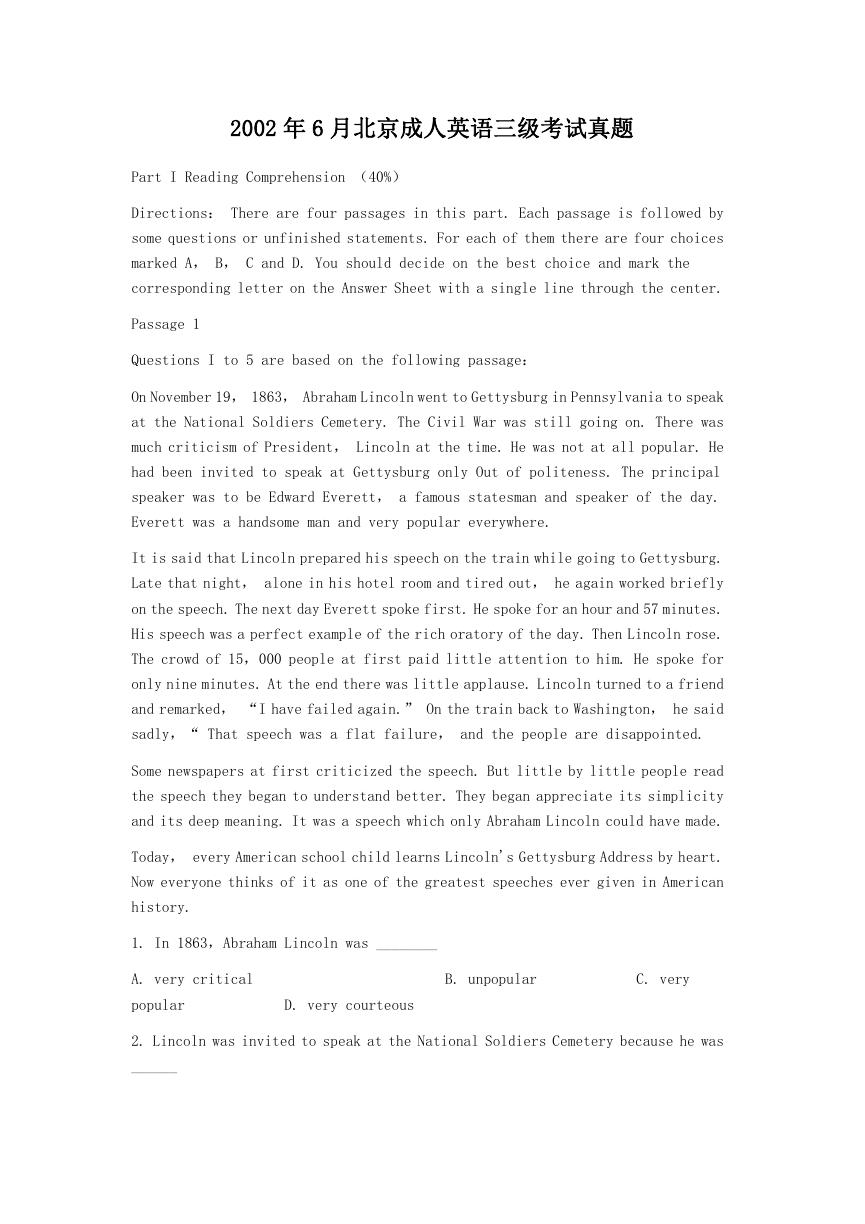
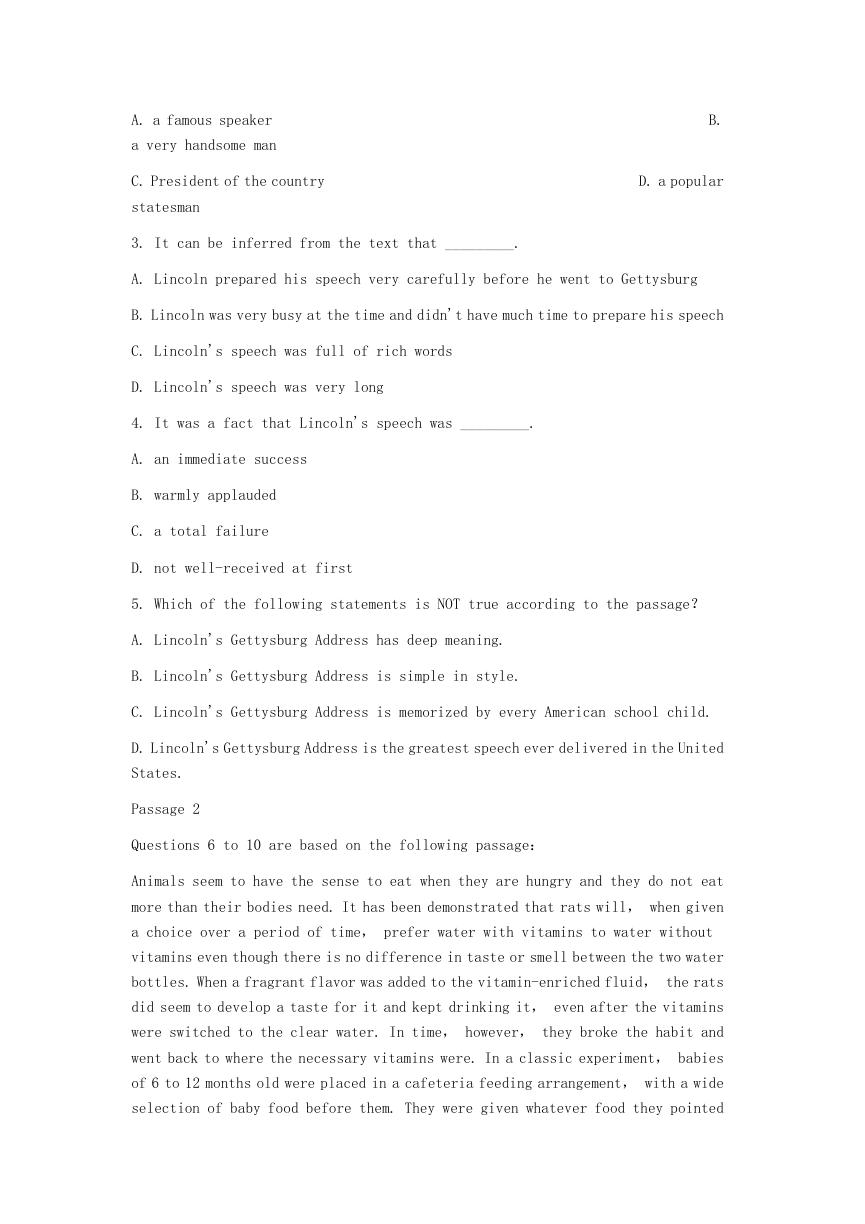
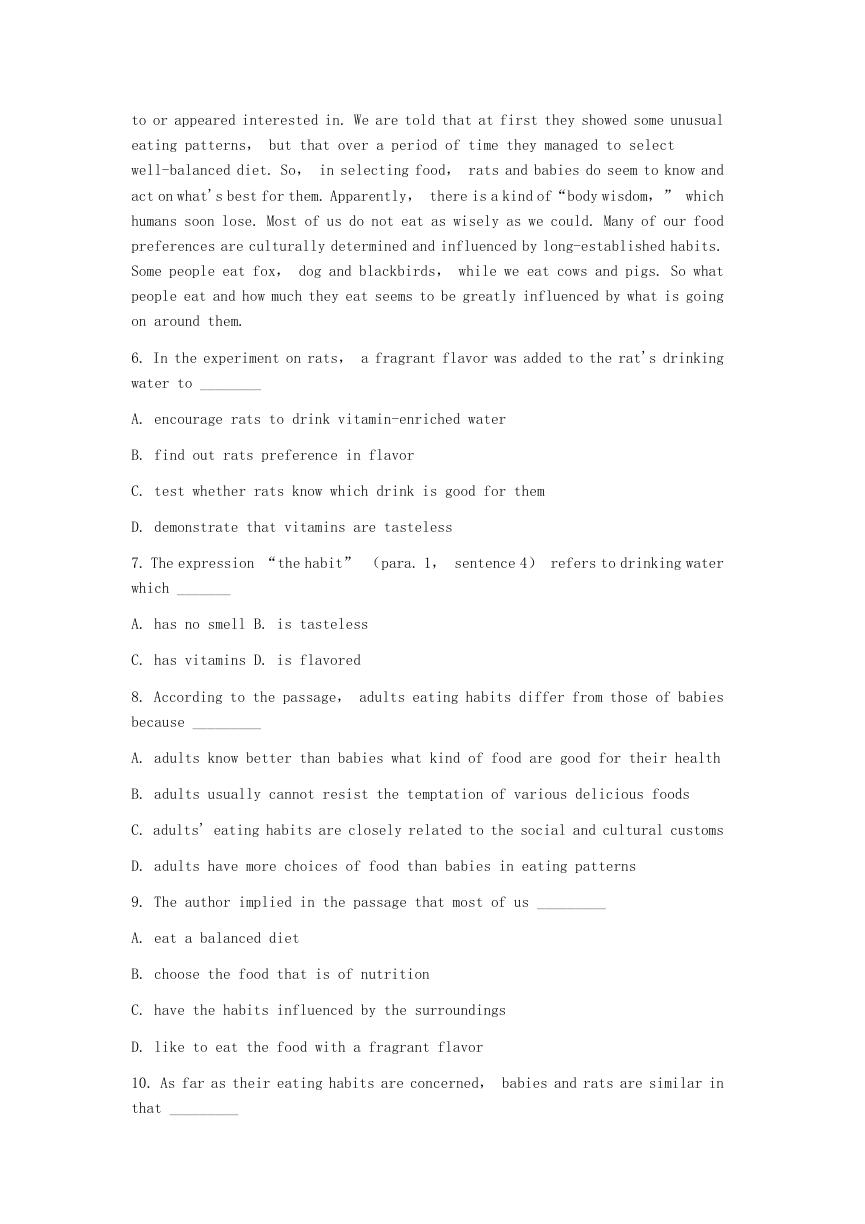
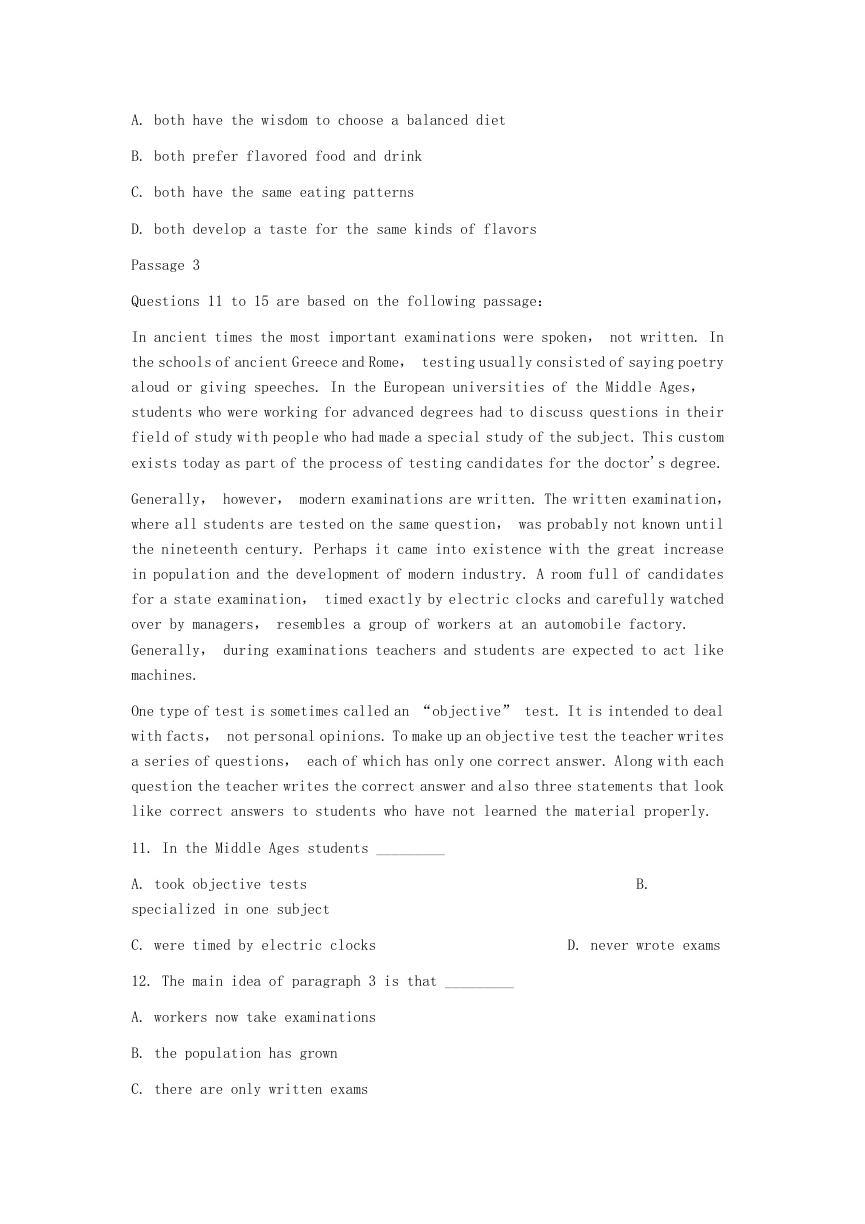
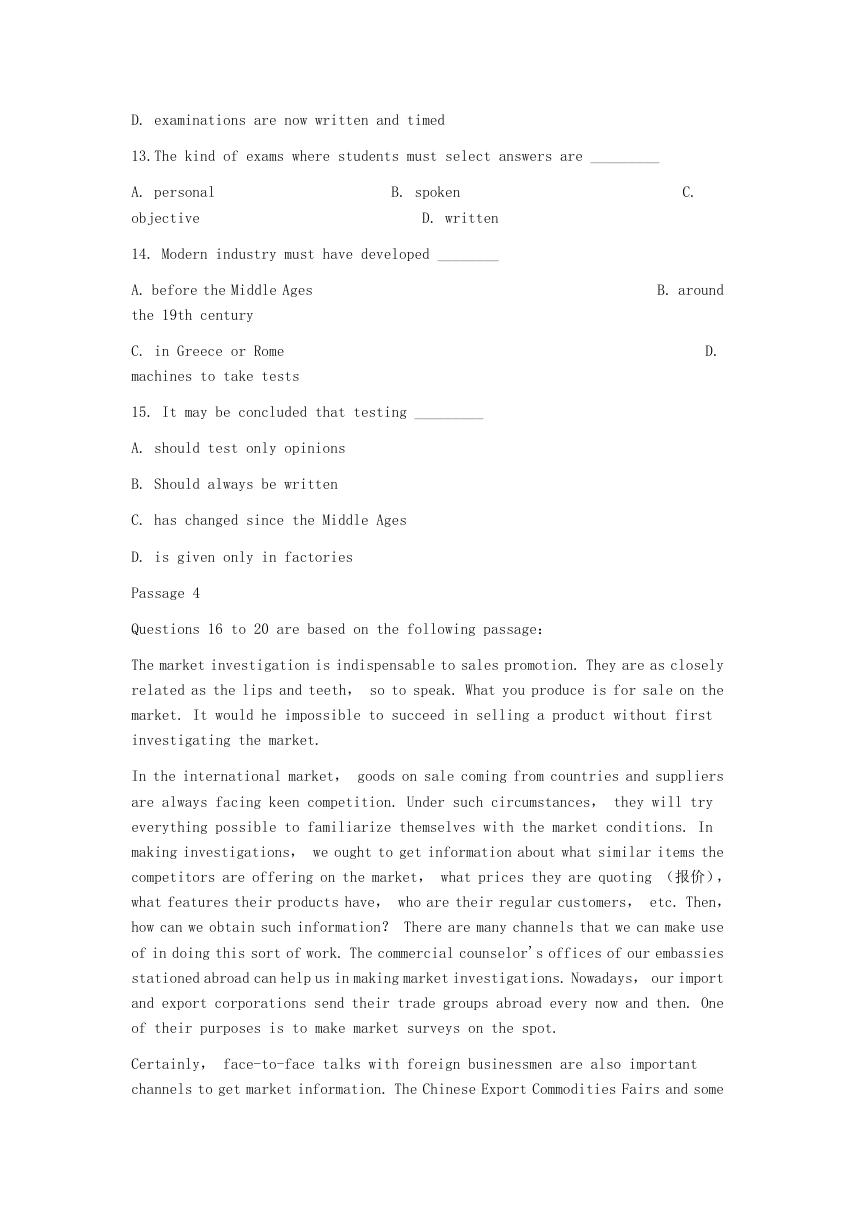
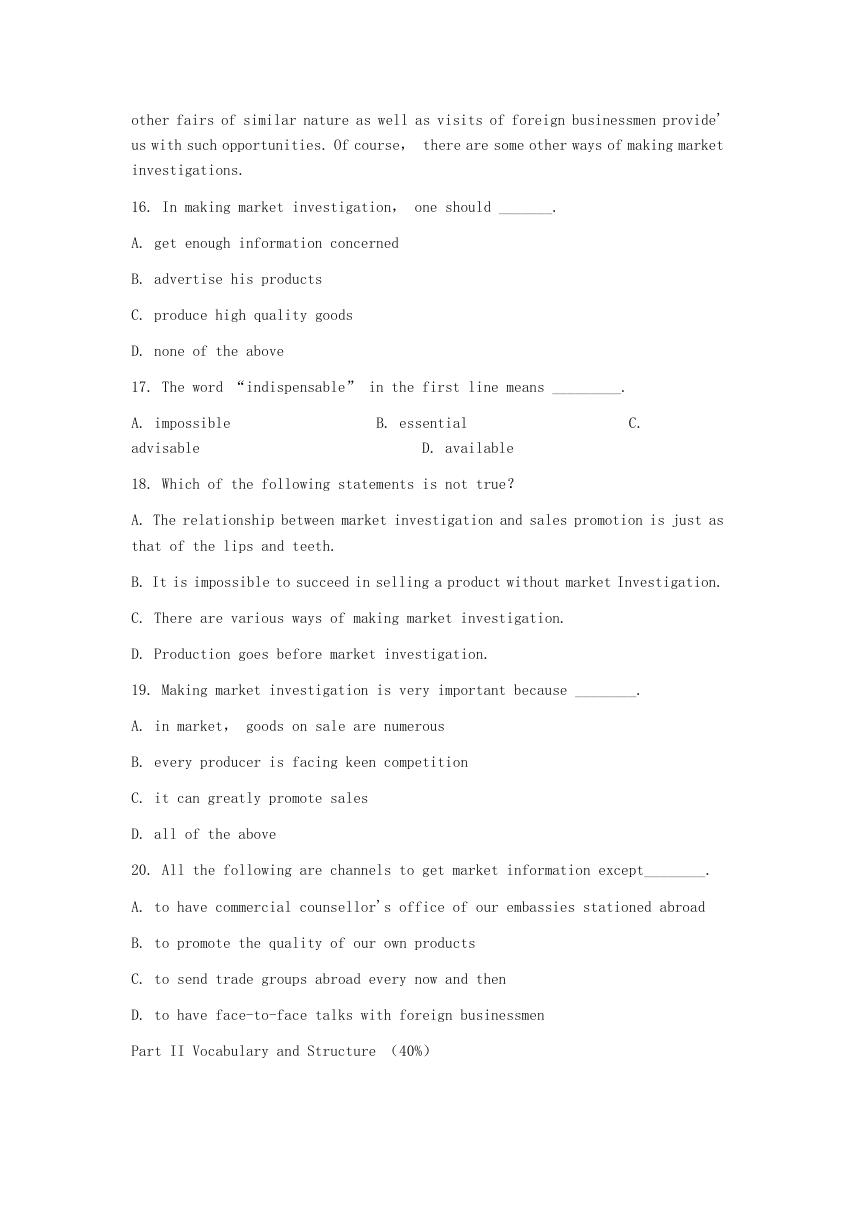

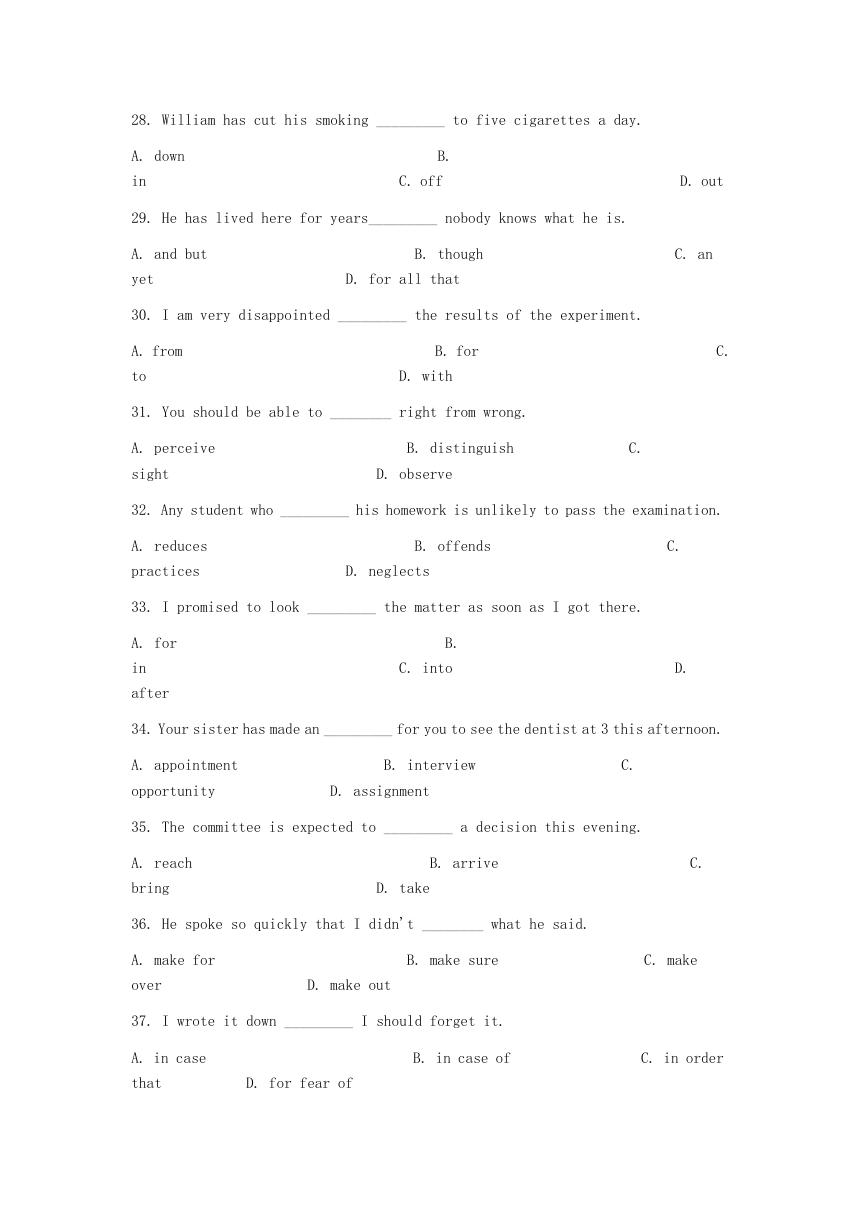








 2023年江西萍乡中考道德与法治真题及答案.doc
2023年江西萍乡中考道德与法治真题及答案.doc 2012年重庆南川中考生物真题及答案.doc
2012年重庆南川中考生物真题及答案.doc 2013年江西师范大学地理学综合及文艺理论基础考研真题.doc
2013年江西师范大学地理学综合及文艺理论基础考研真题.doc 2020年四川甘孜小升初语文真题及答案I卷.doc
2020年四川甘孜小升初语文真题及答案I卷.doc 2020年注册岩土工程师专业基础考试真题及答案.doc
2020年注册岩土工程师专业基础考试真题及答案.doc 2023-2024学年福建省厦门市九年级上学期数学月考试题及答案.doc
2023-2024学年福建省厦门市九年级上学期数学月考试题及答案.doc 2021-2022学年辽宁省沈阳市大东区九年级上学期语文期末试题及答案.doc
2021-2022学年辽宁省沈阳市大东区九年级上学期语文期末试题及答案.doc 2022-2023学年北京东城区初三第一学期物理期末试卷及答案.doc
2022-2023学年北京东城区初三第一学期物理期末试卷及答案.doc 2018上半年江西教师资格初中地理学科知识与教学能力真题及答案.doc
2018上半年江西教师资格初中地理学科知识与教学能力真题及答案.doc 2012年河北国家公务员申论考试真题及答案-省级.doc
2012年河北国家公务员申论考试真题及答案-省级.doc 2020-2021学年江苏省扬州市江都区邵樊片九年级上学期数学第一次质量检测试题及答案.doc
2020-2021学年江苏省扬州市江都区邵樊片九年级上学期数学第一次质量检测试题及答案.doc 2022下半年黑龙江教师资格证中学综合素质真题及答案.doc
2022下半年黑龙江教师资格证中学综合素质真题及答案.doc